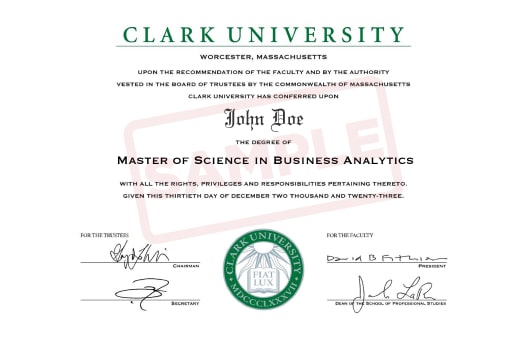STAT 4450 - Managerial Statistics
In this course, you’ll either review or learn the fundamental concepts of statistics and probability, with a focus on managerial applications. Topics include data collection, descriptive statistics, and understanding the characteristics of discrete and continuous probability distributions. You’ll practice sampling, creating confidence intervals, and hypothesis testing. Additionally, the course covers linear regression and correlation techniques to help interpret data for informed decision-making. Tasks are performed in MS Excel, providing you with practical skills for analyzing business data as a basis for the Big Data Statistics courses.
BAN 4500 - Information Systems for Analytics
In this course, you’ll study the organizational context and infrastructure that support business analytics. You’ll explore information systems and technologies, learning how these components—such as hardware, software, cloud services, databases, and networking—enable analytics. This course emphasizes strategic positioning through technology adoption and organizational change. You’ll also delve into security, risk management, privacy, and ethics. Business case analyses and hands-on exercises are used throughout the course to develop solutions and communicate insights to stakeholders, equipping you to improve information system effectiveness in real business environments.
BAN 4550 - Analytics Programming
In this course, you will receive an introduction to programming for analytics, using Python as the primary language. Topics include programming fundamentals such as data types, conditionals, functions, and file handling. By completing this course, you’ll gain the ability to design and develop Python programs suited for data analysis and scientific computing. No prior programming experience is required, but students are asked to complete an introductory online Python course before class starts, ensuring readiness for practical applications in analytics.
STAT 4600 - Intermediary Statistical Modeling for Analytics
In this course, you’ll build upon your statistical knowledge with a focus on descriptive, diagnostic, and predictive analytics. This module covers data collection, hypothesis formulation and testing, and statistical methods that help answer complex business questions. Using R, you’ll work with real-life datasets to conduct analysis, with topics including inferential statistics, linear regression, and predictive modeling. This course emphasizes both statistical theory and practical applications, enhancing your ability to apply analytics in decision-making contexts.
BAN 5501 - Database Management and SQL for Analytics
In this course, you will be introduced to the Database Management Body of Knowledge (DMBOK) from a managerial perspective. The learning objectives will be to fully understand the basic concepts of database design and usage and develop practical skills for utilizing databases to their fullest extent. Correct database design will be emphasized as a theoretical foundation and a practical necessity.
The following topics are the focus of the course:
- High-level, general database concepts and design
- Design, create, and manipulate an individual, relational database, including the utilization of SQL as a fundamental tool
- Interpret and apply client database needs
- Discuss and apply best practices of User Interface Design to database applications
- Identify and discuss new developments and trends in databases, including data warehouses, data lakes and hubs, and X analytics.
STAT 4650 - Machine Learning
In this course, you will explore machine learning techniques used in business analytics, including logistic regression, cross-validation, decision trees, and clustering. You’ll also touch on support vector machines and time series forecasting, if time permits. This module combines mathematical modeling and scenario optimization to enhance decision-making. Using R and Python, you’ll work with real datasets to solve complex problems, focusing on the speed, reliability, and accuracy of decisions informed by machine learning.
BAN 5573 - Visual Analytics and Business Intelligence
In this course, you’ll gain practical experience with business intelligence tools and methods, focusing on enterprise-level analytics through case studies and decision support systems. You’ll spend the initial weeks on descriptive analytics in Tableau, then advance to predictive analytics using KNIME, and finally study prescriptive analytics with Excel Frontline Software and LINGO. By the end, you’ll be able to conduct complete analytic projects, from data gathering and interpretation to project delivery and visual storytelling, enabling effective decision-making support
BAN 5650 - Applied Business Analytics
In this course, you’ll develop the skills to apply data analytics and decision support models to industry problems involving resource constraints and regulatory complexities. Topics include data collection, quantitative modeling, and resource allocation using techniques like capital budgeting, cost-benefit analysis, and Monte Carlo simulation. You’ll learn to frame decision problems in terms of strategy, feasibility, cost-effectiveness, and risk, while applying project management tools to deliver complex analyses and present your findings to stakeholders.
BAN 5600 - Advanced Big Data Computing and Programming
In this course, you’ll learn to work with large data volumes using Big Data platforms within the Hadoop ecosystem, such as Pig, Hive, Flume, Sqoop, and Spark. This course emphasizes the use of distributed and parallel computing to process and analyze structured and unstructured data. You’ll explore real-world Big Data applications, covering essential platforms like Hortonworks Sandbox, Amazon AWS, and Databricks. Topics include visualization, Natural Language Processing, and streaming analytics, equipping you to manage high-volume, high-velocity data challenges.














































